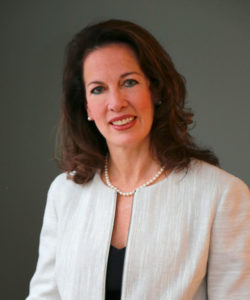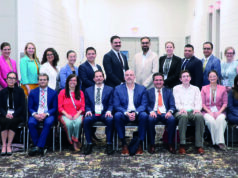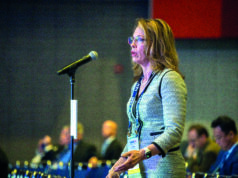
The World Federation of Vascular Societies (WFVS) is bringing the vascular world together at CX 2024 to chew over both challenging cases and leadership challenges.
The pair of sessions is part of the legacy left by Professor Roger M. Greenhalgh, the late CX Symposium chair, and his dedication to concepts such as the Hurting Leg and the Worrying Foot.
First up on Thursday from 1:30 p.m. to 3:20 p.m. (BST), Palma Shaw, MD, a professor if surgery at Upstate Medical University in Syracuse, New York, the WFVS secretary-general, and Prem Chand Gupta, MD, from Hyderabad, India, its president, will moderate a string of surgeons from across the global vascular biosphere as they present their experiences with challenging cases.
The session grew out of the WFVS Global Training Initiative and its commitment to help trainees around the world to plug gaps in their training.
Experienced surgeons will present on such topics as “Angulated aortic neck: Sliding through a reverse slider technique,” by Pranati Swain (Delhi Cantt, India) representing the Vascular Society of India, and “Pseudo aneurysm from right coronary button with previous ascending stent graft,” by Thodur Vasudevan (Hamilton, New Zealand), representing the Australian & New Zealand Society for Vascular Surgery (ANZSVS). All member societies of WFVS will be represented.
“At the Global Training Initiative, we thought we could meet the needs of trainees around the world on things they were missing in their training,” said Shaw. “We’d been meeting for a while to discuss these things and Roger joined us because he was very committed to this.
“We have 11 cases of five minutes each then a further five for discussion.”
The Challenging Cases session will be followed at 3:20 p.m. to 3:50 p.m. by a Leadership Challenges session, moderated by Shaw and Manual Garcia-Toca, MD, a vascular surgeon at Emory University in Atlanta, the chair of the Society for Vascular Surgery (SVS) Leadership Development Committee.
“At the Global Training Initiative, we realized that in addition to the need for access to different clinical scenarios and the hard knowledge of vascular surgery, there is a need for soft skills— all the things nobody teaches you during training that you need to survive,” continued Shaw.
“You can be a great surgeon but if you come in and don’t read the room right, you can make the wrong comments. These are things nobody teaches you, that some people are just better at than others.”
The Leadership Challenges session aims to address these areas and will see two female speakers deliver talks. “Navigating the waters: Strategies for launching a new clinical program in vascular surgery” will be given by Vaiva Dabravolskaite (Bern, Switzerland), and “Bridging divides: Effective approaches to managing interdepartmental turf battles” will be presented by Desiree van den Hondel (Renkum, Netherlands) before a senior panel discusses how they would manage these scenarios.
“With the first one, the idea is to assess, ‘How would you approach that, and what challenges would you anticipate, how would you develop your team and how would you pitch this to the leadership?’” said Shaw.
In the case of the latter talk, the overlapping specialties that treat vascular disease is the focal point. “This really has a lot to do with the fact interventional radiology, interventional cardiology and vascular surgery have a lot of overlap—and even neurointerventional,” added Shaw. “Everywhere politics is local. In a large private hospital, it is different than in a big academic center. Perhaps in The Netherlands it is different than in the U.S. These are things that are important because more and more people, mid-career, are getting their MBAs, and we are finding that we need these skills to help deal with problems and challenges with administration to protect our own vested interests.”












